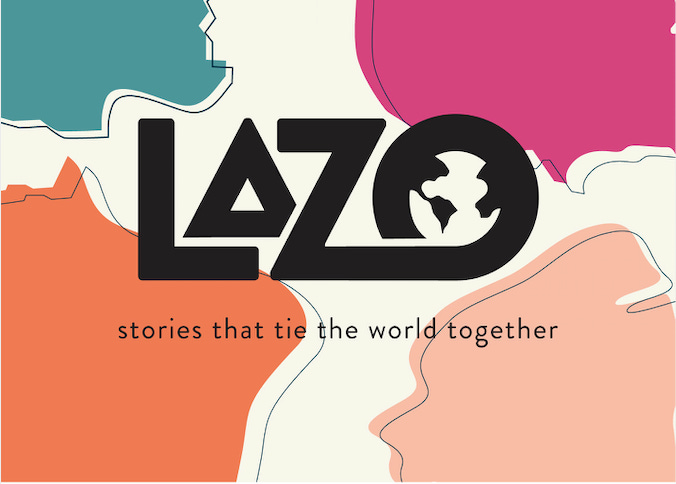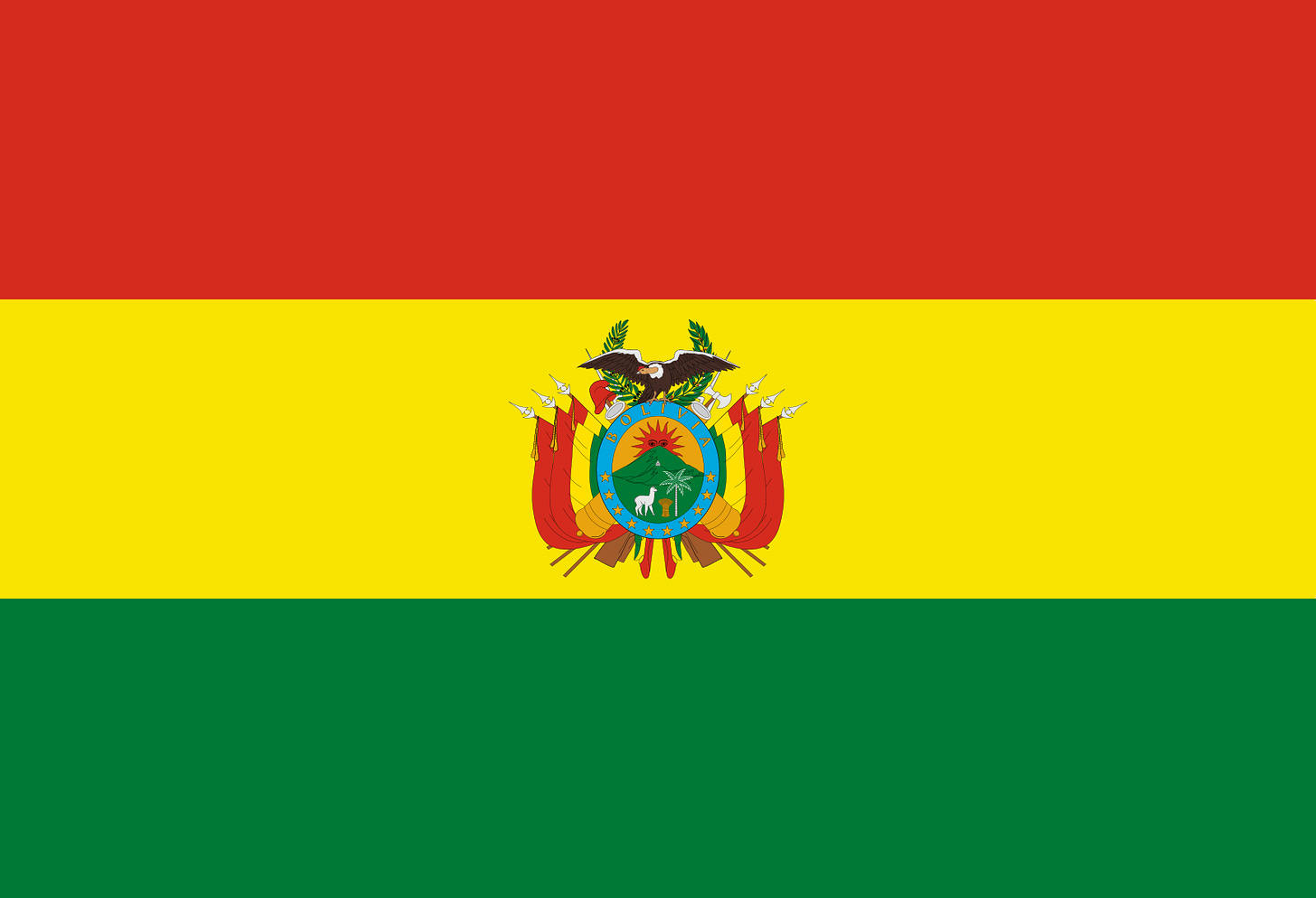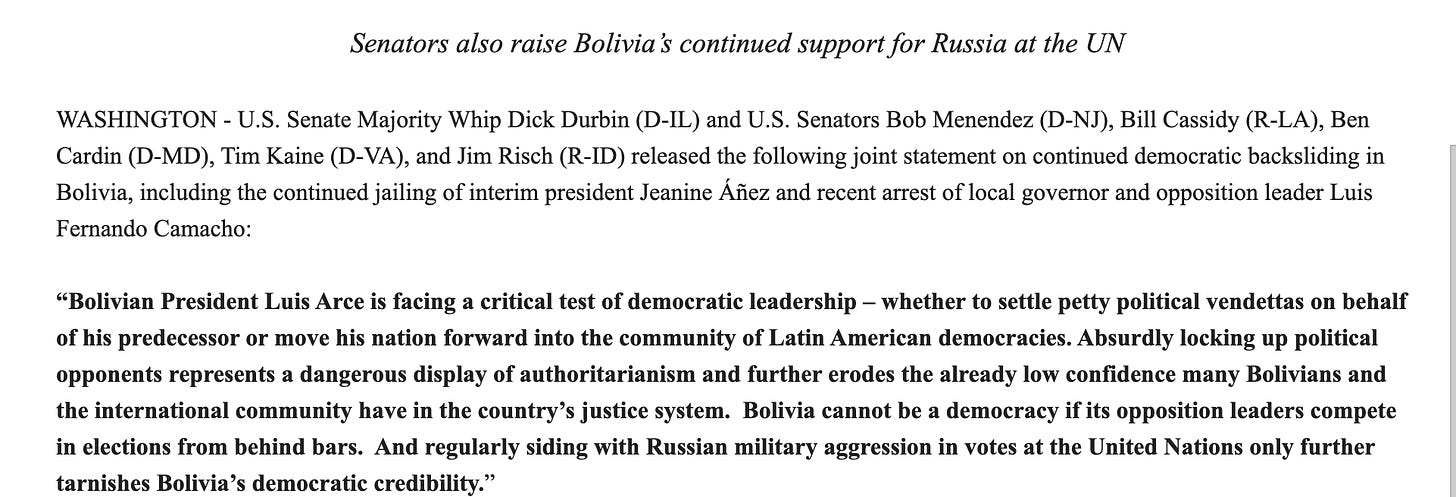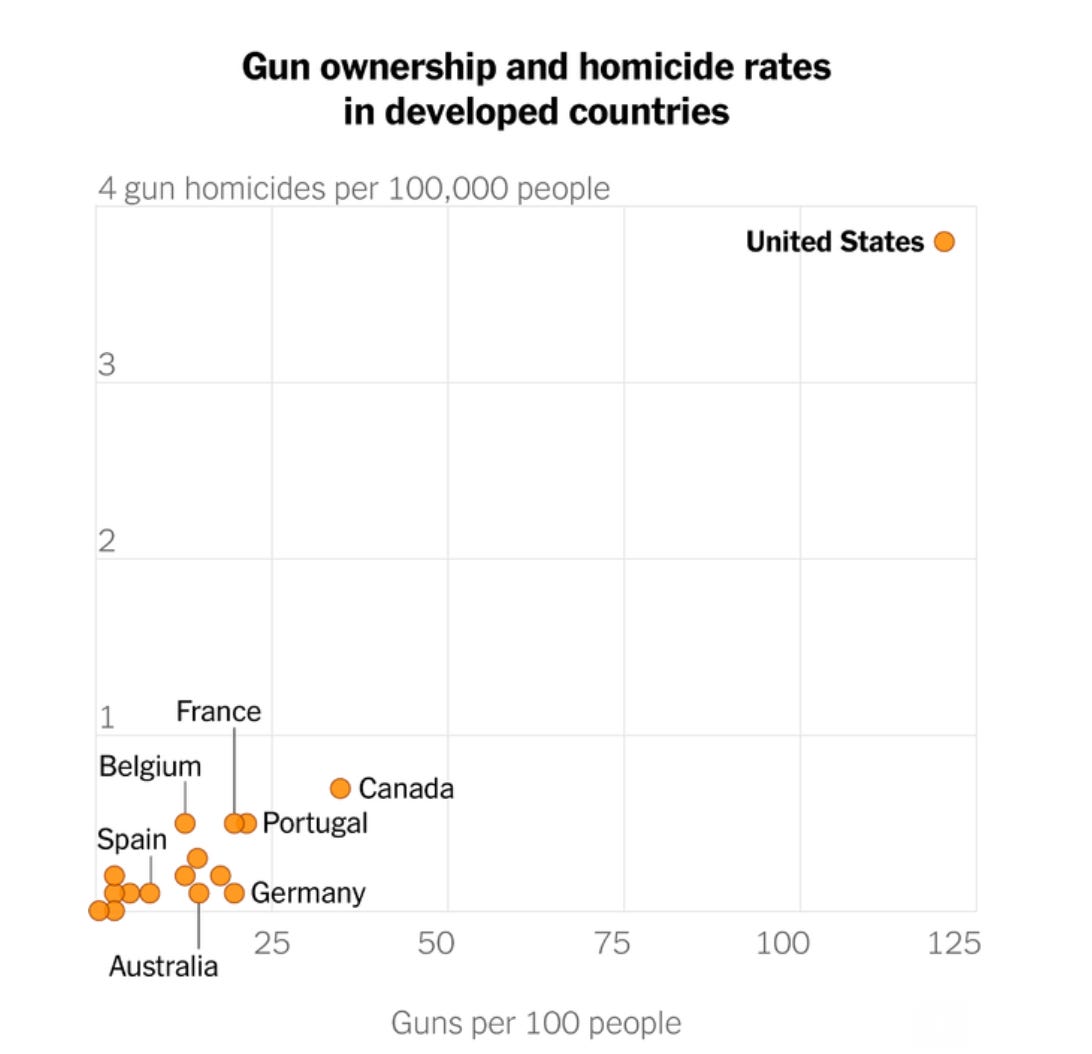#21 Bolivia
This week is about Bolivia.
Welcome to the 195 series, where I take you on a mini-tour of every country (and maybe some places that want to be countries). Each week I'll feature a new location. Some you may have heard of, while others may be new to you. The point is to learn and nurture our curiosity about the wider world. Maybe you'll find a new artist or musician you like, too.
Here's the link to copy and paste in your browser if you're interested in supporting this project: https://lazo-letters.ghost.io/#/portal/signup. You can sign up for $2 a month or $22 a year.
Country Info:
Population: Roughly 12 million.
Current government: Bolivia is a constitutional republic. The country's president is the head of state and government and is directly elected to a five-year term.
Bolivia has experienced a complicated couple of years politically.
Early polling during the October 2019 presidential election showed the incumbent, Evo Morales (in power from 2006 until 2019), and the leading opposition candidate, former president Carlos Mesa, neck and neck. Everyone expected the elections to go to a runoff.
But toward the very end of the vote, election officials released an updated count showing Morales had won an outright victory. Many thought the election was rigged and went to the streets to demonstrate.
The electoral observation mission of the Organization of American States – an international organization – criticized the election results, arguing that they were suspicious and contradicted independent vote counts.
But many independent analysts have since criticized the OAS opinion and the organization's role in the country at the time. Subsequent counts analyses found that Morales had won primarily due to votes from rural, indigenous regions.
Nevertheless, less than a month after the 2019 vote, Morales resigned for "the good of the country," and the right-wing Senator Jeanine Áñez became interim president. She went on to rule Bolivia for a year.
In October 2020, former finance minister Luis Arce of the leftist Movement Toward Socialism — the party of former President Morales — won a new round of elections without a runoff. He has since jailed Jeanine Áñez for mounting a coup in 2019.
Most recently, Arce's government also arrested the governor of Santa Cruz, Luis Fernando Camacho, after he did not appear to testify in court for a case known as Golpe I. Camacho is also accused of terrorism for his role in the 2019 protests.
This is what U.S. lawmakers had to say about that earlier this month:
The North American Congress on Latin America explained it like this:
According to the government, Camacho’s detention is about doing justice for the deaths at Sacaba and Senkata, two massacres that left 21 people dead in November 2019 during the first days of Áñez's government. However, the Golpe I case, in relation to which Áñez has also been detained for 20 months, does not cover these massacres but rather the actions that led to Morales’s resignation.
Languages spoken: Spanish is Bolivia's official language, but many people speak indigenous languages like Quechua and Aymara. Over 60 percent of Bolivia's population is indigenous, and the constitution recognizes all indigenous languages as official, even some that people no longer speak.
According to this 2009 book from Drake University Press, Bolivia introduced bilingual education in the 1990s.
In 1994, amid rising indigenous mobilization and a government turn toward free-market policies, the Bolivian congress signed a national education reform into law. The reform proposed to restructure Bolivian schooling in tandem with a wider process of neoliberal structural adjustment.¹ The plan included a controversial component called bilingual intercultural education that promoted the introduction of indigenous languages alongside Spanish in public elementary schools in indigenous regions.
Religion: Most people in Bolivia are Roman Catholic, but indigenous Bolivians often blend Catholicism with their traditional religious practices.
Standout artist: Roberto Mamani Mamani.
Above all else, his work is instantly recognizable for its vibrant colors, a style that has been influenced by indigenous Bolivian weavers. Each painting is chock-full of elements symbolizing Andean heritage, such as cholitas, condors, mountains and llamas. Many of his symbols also contain a hidden meaning. For example, a yellow sun represents masculinity while a blue moon portrays femininity. Mamani Mamani’s psychedelic, abstract art is a uniquely modern representation of indigenous heritage. It is his vision of his people through texture, character, emotion and feeling.
Paintings to be sold in our website https://t.co/G06SPGLEat in a few days - obras en venta en algunos dias pic.twitter.com/ruO2eM4vCU
— Mamani Mamani Europe (@mamanimamanieu) June 24, 2016
Standout film: Utama, about an elderly Quechua couple planning their future in the country's arid highlands.
A surprising thing: The Amazon basin in Bolivia has pink river dolphins. Yes, really.
Story of the week: The new movie Women Talking portrays women in an isolated religious community reconciling widespread sexual assault with their faith. It turns out the film was based on actual events that took place in Bolivia.
Insider looks at the isolated Mennonite community in Bolivia, where eight men were accused of raping more than a hundred women and girls. The Mennonites of Manitoba Colony are a religious community of European descent.
Know something I don't about Bolivia? Get in touch or leave a comment.
What I'm writing:
Some Republicans on Capitol Hill are asking why the administration hasn’t already helped Ukraine eject the Russian invaders quickly and decisively. @CrisLeeMaza reports:https://t.co/WNqwSuuAX9
— National Journal (@nationaljournal) January 26, 2023
• Lawmakers on Capitol Hill have launched into action to defend Brazil’s democracy after the violent storming of government buildings this month in the country’s capital conjured up images of the U.S. Capitol riots two years prior. This story is unlocked and free to read.
• Republican Senators are calling on the Biden administration to do more to help Ukraine prepare for a new spring offensive. Many are asking why it took so long for the administration to send Kyiv battle tanks.
• If you want to hear my interview on Ken Sweeney's podcast, the Comfortable Spot, you can listen to the whole thing here. We talk about the U.S. defense budget, why the United States doesn't have social policies that Europeans consider common sense, and other topics related to why America is gonna America.
In the next episode of #TheComfortableSpot #Podcast my guest Washington based Journalist Cristina Maza @CrisLeeMaza. We talk #USPolitics and in this clip, Cristina discuses the growing far right influence in the #RepublicanParty. #GOP #DEM #Trump #Biden pic.twitter.com/2Z7FAx4AAk
— The Comfortable Spot Podcast 🎙️🎧 (@ComfortableSpot) January 21, 2023
What I'm reading:
• For The Beet, culture writer Kayti Burt reports on how a generation of filmmakers who grew up amid Tajikistan’s civil war are trying to tell their country’s stories.
• My friend Molly McCluskey has a newsletter with personal histories and stories from Washington, D.C.'s embassies. She also tells you little tidbits like protesters blocked the entrance and road leading to the Azerbaijani embassy this week, or the Venezuelan embassy, which was run by the opposition, formally stopped operation as of January 5.
• Moscow added Latvia-based independent news website Meduza to a list of organizations banned from operating in Russia.
Meduza has been declared an “undesirable” organization in Russia. In other words, our newsroom’s work is now completely banned in the country our founders call home. Here is our response the authorities’ decision to outlaw our journalism. https://t.co/uLYaoqc3b8
— Meduza in English (@meduza_en) January 26, 2023
• Resident Adviser profiles the Palestinian techno DJ Sama' Abdulhadi.
• Ukraine's forces are making progress around a strategic city in the eastern Luhansk region ahead of a new Ukrainian counteroffensive to retake territory this spring, Politico reports. The strategic city, Kreminna, is seen as a gateway to Sievierodonetsk and Lysychansk, two key industrial centers in the Donbas region that Russia seized last summer.
• Ukrainian forces retreated from the town of Soledar near the strategic eastern city of Bakhmut, the New York Times reports.
• Russia is planning to make it mandatory for anyone leaving the country by car starting March 1 to book a time and place at a border crossing, Reuters reported. Some have wondered whether the Kremlin plans to prevent military-aged men from leaving Russia.
• Several senior Ukrainian officials left their posts as Ukraine renewed its anti-corruption efforts, the BBC reports. The departures included Kyrylo Tymoshenko, Ukrainian President Volodymyr Zelenskyy’s deputy head of office, four deputy ministers, and five regional governors. Senior aide Mykhailo Podolyak said Zelenskyy was responding to a "key public demand" that justice should apply to everyone.
• Ukraine’s Defense Minister Oleksii Reznikov and Deputy Infrastructure Minister Vasyl Lozynskiy are also implicated in the corruption probe, Politico Europe reports. The allegations about Reznikov, which he denies, involved purchases of military rations at inflated prices. Lozynskiy, meanwhile, was fired over a case linked to an overpriced public purchase of electrical generators. The National Anti-Corruption Bureau of Ukraine said it was investigating both matters.
• Five top regional prosecutors were dismissed from their jobs one day after Ukrainian President Volodymyr Zelenksyy launched Ukraine’s latest anti-corruption drive, Reuters reports.
• U.S. and European officials believe that Russian agents directed associates of a far-right, white supremacist militant group based in Russia to carry out a recent letter bomb campaign in Spain, the New York Times reports.
• Spanish police arrested a man in connection with the letter bombs sent to the Ukrainian and U.S. embassies and other institutions late last year. The man, a Spanish citizen, was detained in the northern town of Miranda del Ebro, Reuters reports.
• A former high-level FBI official was charged with taking money from a former foreign intelligence service agent and conspiring to violate U.S. sanctions by taking secret payments from Russian oligarch Oleg Deripaska, the New York Times reports on their live blog. The former official, Charles McGonigal, was the special agent in charge of the FBI’s counterintelligence division in New York before retiring in 2018.
• A Ukrainian intelligence report revealed the battleground tactics of the Russian paramilitary organization Wagner Group around the city of Bakhmut. The report, obtained by CNN, concludes that Wagner represents a unique threat, given the group's indifference to casualties. “The deaths of thousands of Wagner soldiers do not matter to Russian society,” the report asserts. Wounded Wagner fighters are often left on the battlefield for hours, and unauthorized retreat is punishable by execution on the spot.
• The U.S. designated the Russian paramilitary organization Wagner Group as a significant transnational criminal organization, the New York Times reports. The move will allow the government to freeze any assets the organization may have in the U.S. and ban Americans from providing money, goods, or services to the group.
• In an interview with Politico Europe, Moldova's President Maia Sandu said people are beginning to discuss whether the country should be part of a defense alliance. Sandu, a pro-Western former World Bank official, said that while neutrality is enshrined in the constitution, there were now “serious discussions about Moldova’s capacity to defend itself” given its proximity to Russia’s war in Ukraine.
• The Pentagon will keep several thousand American troops in southeast Romania for at least nine more months, the New York Times reports.
• Albania's police are continuing an operation to find and dismantle surveillance cameras illegally erected in cities by criminal groups to collect information and monitor police movements, Balkan Insight reports.
• Germany yesterday charged five suspects in a plot to kidnap the country’s health minister and overthrow the government, the Washington Post reports. Germany’s public prosecutor said the group planned to blow up power infrastructure, “trigger civil-war-like conditions,” and overthrow democracy.
• Sweden's NATO bid is in peril after the country permitted a Koran-burning protest outside the Turkish embassy in Stockholm, the Financial Times reports.
• Finland may consider joining NATO without Sweden if Stockholm’s application is stalled, the Washington Post reported, citing Finnish Foreign Minister Pekka Haavisto.
• Prosecutors sought a 13-year sentence for a former leader of the Hells Angels in Europe who is accused of running a chapter of the motorcycle club linked with organized crime on the Spanish island of Mallorca. ABC has the story.
• Parliamentarians from Southeast Asia are urging the Thai government to stop engaging with the Myanmar junta and provide help to refugees and asylum seekers fleeing persecution and military attacks.
• Israeli troops killed at least nine Palestinians in one of the deadliest days in the occupied West Bank since Israeli raids intensified last year, Al Jazeera reports. The Palestinian Ministry of Health said 20 others were wounded with live ammunition in the attack on the Jenin refugee camp, which Palestinians have described as a "massacre."
• India has blocked the airing of a BBC documentary that questioned Prime Minister Narendra Modi’s leadership during the 2002 Gujarat riots, saying that even sharing of any clips via social media is barred, CNBC reports.
• Haiti has no democratically elected government after its ten remaining senators departed office last week after their terms ended, the Washington Post reports. The country has had no president since its last one, Jovenel Moïse, was assassinated in 2021. The national government is run by Ariel Henry, an appointed prime minister who has yet to set a date for elections and is accused by opponents of being a dictator.
• Tanzanian opposition leader and former presidential candidate Tundu Lissu returned home to a cheering crowd after more than two years in exile in Europe. Al Jazeera has the story.
• The military government of Burkina Faso has demanded the departure of French troops from the country, CNN reports. France has agreed to withdraw all its troops.
You can write to me for any reason: c.maza@protonmail.com








